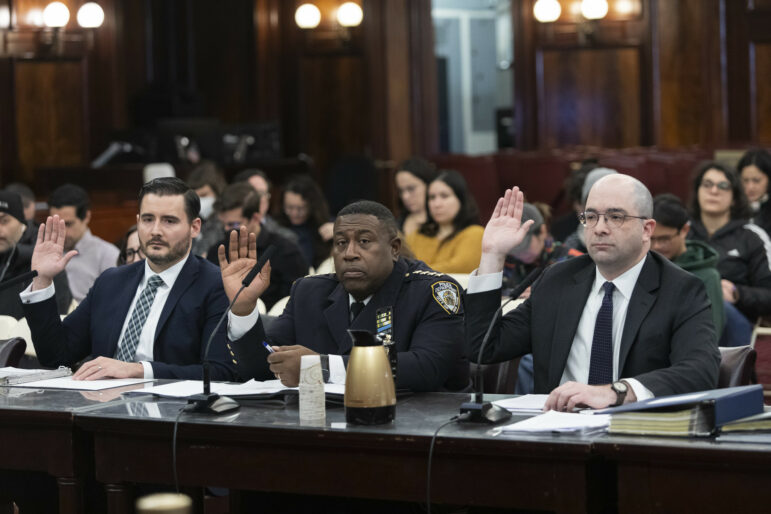“We need transparency to deter government abuses of these dangerous technologies and hold governments accountable when they break the law. Yet, many government agencies, including NYPD, refuse to provide this essential information to the public.”

NYC Council Flickr
NYPD officials testifying at a New York City Council oversight hearing on the POST Act on Dec. 15, 2023.In September, investigative journalists published NYPD documents that I obtained with the Surveillance Technology Oversight Project after over a year of open record requests, delays, and denials. We showed the NYPD spent over $10 million on contracts with Voyager Labs, which scrapes global social media for everything from politics to protests. It was a major win to publish the contracts, but under local law, this information should have been public to begin with.
New York City passed a technology oversight law called the Public Oversight of Surveillance Technology Act (POST Act) in 2020. New York’s law built upon the Community Control Over Police Surveillance (CCOPS) model of California cities, including Berkeley, Davis, and Oakland. Under the POST Act and these other ordinances, government agencies must disclose the technology they use and how they use it, including internet surveillance like Voyager Labs.
The POST Act has been a partial success, uncovering the general descriptions of NYPD’s surveillance tools and enabling the litigation that revealed this Voyager contract. But years later, NYPD continues violating the POST Act by refusing to disclose basic information about this technology in public reports and twisting the POST Act’s language to maintain secrecy over public investments and police operations.
While the POST has been a success, revealing more than $3 billion in secret NYPD surveillance contracts between 2007 and 2019, CCOPS have been more effective in cities with stronger transparency requirements. When I was still a law student, I closely watched how Davis, CA, complied with its CCOPS and transparency ordinance.
As an informed outsider, it seemed like a big success in more than one case. I’ll always remember when a string of robberies inspired the City Council to consider installing traffic cameras around the highway entrances to downtown, and proposed using those cameras to check every vehicle passing by against a registry of suspected criminals. The CCOPS process went exactly as intended: the Davis Police Department laid out the specific tools it was considering and how they functioned. Then after a robust public debate, the Davis City Council ultimately decided against the proposed plan, due to cost, privacy, and efficacy concerns.
But in New York, the NYPD won’t even tell us what technology it already uses, much less walk back its plans to buy new technology after the public rejects it.
Without transparency, there is no way to know if local governments are respecting our civil rights. Almost explicitly, governments purchase surveillance programs like Voyager to run circles around our Fourth Amendment rights against searches, seizures, and surveillance. Additionally, these programs violate Americans’ right to anonymity in grassroots advocacy and organizing, as police may use purchased data to identify anyone who attends a protest. We need transparency to deter government abuses of these dangerous technologies and hold governments accountable when they break the law. Yet, many government agencies, including NYPD, refuse to provide this essential information to the public.
New York City is the perfect case study in why CCOPS should only be an indispensable first step. Some agencies are used to unquestioned independence, operating outside of normal public oversight. Without a culture change and strong laws mandating reform, they will always crave secrecy and continue to mislead the public—in the case of NYPD, telling half-truths instead of coming clean about tech’s ineffectiveness at reducing crime and its invasive privacy implications.
After transparency, we need mandatory regulation and outright bans on the most dangerous surveillance practices, including mass warrantless location and social media surveillance. As we’ve seen, even in cities with strong CCOPS laws, like San Francisco, police seek novel ways to circumvent their notice and transparency requirements. Mandatory, legal limits are the only way to ensure real public control over mass surveillance.
Last month, NYPD finally showed up to a City Council hearing on the POST Act after failing to attend previously scheduled dates three times in a row. Prior to the hearing, civil rights groups and elected officials shared fierce criticism of the department’s blatant disregard for the law and called on the City Council to strengthen the POST Act with two new amendments. Predictably, NYPD doubled down and staunchly opposed the new legislation, which speaks volumes: The POST Act and its new amendments are bare minimum requirements for transparency, so if they have nothing to hide, they should have no problem complying.
Evan Enzer is a Berkeley Law graduate, certified privacy professional, and former program associate at The Surveillance Technology Oversight Project.









2 thoughts on “Opinion: Unearthing the NYPD’s Secrets”
Thanks for sharing this firsthand experience! It’s a refreshing reminder that CCOPS can be a powerful tool for good, promoting open dialogue and protecting individual rights in the face of ever-evolving surveillance technologies.
really?